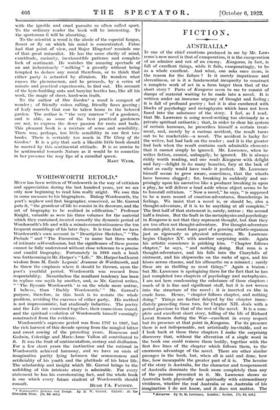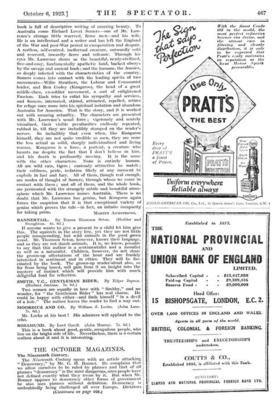FICTION.
AUSTRALIA.*
IF one of the chief emotions produced in me by Mr. Law- rence's new novel is that of exasperation, it is the exasperation of an admirer and not of an enemy. Kangaroo, in fact, is full of excellent things, while it fails, exasperatingly, to be as a whole excellent. And what, one asks once more, is the reason for the failure ? Is it merely impatience and slovenliness, or is it a fundamental incapacity to construct a complete work of art in a form larger than that of the short story ? Parts of Kangaroo seem to me to consist of dumps of material waiting to be made into a novel. It is written under an immense urgency of thought and feeling ; it is full of profound poetry ; but it is also cumbered with blocks of psychology and metaphysics which have not been fused into the substance of the story. I feel, as I read, that Mr. Lawrence is using novel-writing too obviously as a private spiritual cathartic ; that, in order to clear his system of certain humours, he prescribes himself a certain treat- ment, and, merely by a curious accident, the result turns out to be marketable—a novel. The accident is lucky for the writer, but bad luck on the reader ; and it is the greater bad luck when the result contains such admirable elements that it cannot simply be ignored. Mr. Lawrence, when lie writes fiction, cannot, unhappily, be ignored. He is always richly worth reading, and one reads Kangaroo with delight and fury—delight in its many beauties, fury at the lack of what so easily would have made it perfect. Mr. Lawrence himself seems to grow aware, sometimes, that the wheels have become clogged ; for, breaking in suddenly and sur- prisingly upon his narrative like a producer breaking in upon a play, he will deliver a loud aside whose object seems to be to forestall criticism. Now a novel," he says, " is supposed to be a mere record of emotion-adventures, flounderings in feelings. We insist that a novel is, or should be, also a thought-adventure, if it is to be anything at all complete." The first half of that statement is, surely, untrue ; the second half a truism. But the fault in the metaphysics and psychology in Kangaroo is not that they represent thought, but that they are too often not thought-adventure. For thought-adventure demands plot, it must form part of a growing artistic organism just as rigorously as physical adventure. Mr. Lawrence begins Chapter XV. with another surprising aside. Again his artistic conscience is pricking him. Chapter follows chapter," he says, " and nothing doing. But man is a thought-adventurer, and his falls into the Charybdis of ointment, and his shipwrecks on the rocks of ages, and his kisses across chasms, and his silhouette on a minaret ; surely these are as thrilling as most things." Again a truism : but Mr. Lawrence is apologizing there for the fact that he has just completed two chapters of psychology and metaphysics. I am not here condemning the substance of those chapters : much of it is fine and significant stuff, but it is not woven into the structure of the novel ; it is inserted en bloc in crude form. Hence, " chapter follows chapter, and nothing doing." Things are further delayed by the chapter imme- diately preceding those two, for Chapter XII. deals with a period previous to that of the rest of the novel. It is a com- plete and excellent short story, telling of the life of Richard Lovat Somers during the War—excellent in every respect but its presence at that point in.Kangaroo. For its presence there is not indispensable, not artistically inevitable, and as I look back at these three chapters I make the surprising discovery that, without the alteration of a single word in the book one could remove them bodily, together with the first five lines of the chapter which follows them, to the enormous ad vantage of the novel. There are other similar passages in the book, but, when all is said and done, how fine, how inescapable the greater part of it is. The heroine of the story is Australia, for the character and temperament of Australia dominate the book more completely than any of the persons presented in it. Mr. Lawrence shows us Australia both physically and spiritually with extraordinary vividness, whether the real Australia or an Australia of his imagination I do not know, and it does not matter. The • Kangaroo- By D, IL Lawrence, London Seeker, [75, 6d. net.] book is full of descriptive writing of amazing beauty. To Australia come Richard Lovat Somers—one of Mr. Law- rence's strange little reserved, fierce men—and his wife. He is an intellectual and a writer and has left the England of the War and post-War period in exasperation and despair. A restless, self-centred, ineffectual creature, outwardly cold and reserved, inwardly fierce and volcanic. Through his eyes Mr. Lawrence shows us the beautiful, newly-civilized, free-and-easy, fundamentally apathetic land, backed always by the savage and ancient bush ; and the humans, the Aussies, so deeply infected with the characteristics of the country. Somers comes into contact with the leading spirits of two movements—Willie Struthers, the Labour and Communist leader, and Ben Cooley (Kangaroo), the head of a great middle-class, ex-soldier movement, a sort of enlightened Fascism. Each tries to enlist his sympathy and services, and Somers, interested, stirred, attracted, repelled, retires for refuge once more into his spiritual isolation and abandons Australia for America. That is the story, and it is worked out with amazing actuality. The characters are presented with Mr. Lawrence's usual force ; vigorously and acutely visualized, their visible peculiarities endlessly repeated, rubbed in, till they are ineludibly stamped on the reader's nerves. So ineludibly that even when, like Kangaroo himself, they are not quite credible as men, they are none the less actual as solid, sharply individualized and living masses. Kangaroo is a force, a portent, a creature who haunts me despite the fact that I don't believe in him, and his death is profoundly moving. It is the same with the other characters. None is entirely human. All are wild cats, tigers ; curiously attractive to watch ; their coldness, pride, isolation likely at any moment to explode in lust and fury. All of them, though real enough, are modes of thought of Somers, through whom we come in contact with them ; and all of them, and the whole book, are permeated with the strangely subtle and beautiful atmo- sphere which Mr. Lawrence names Australia. There is no doubt that Mr. Lawrence has genius, but Kangaroo again forces the suspicion that it is that exceptional variety of genius which proves the rule—in fact, an infinite incapacity











































 Previous page
Previous page